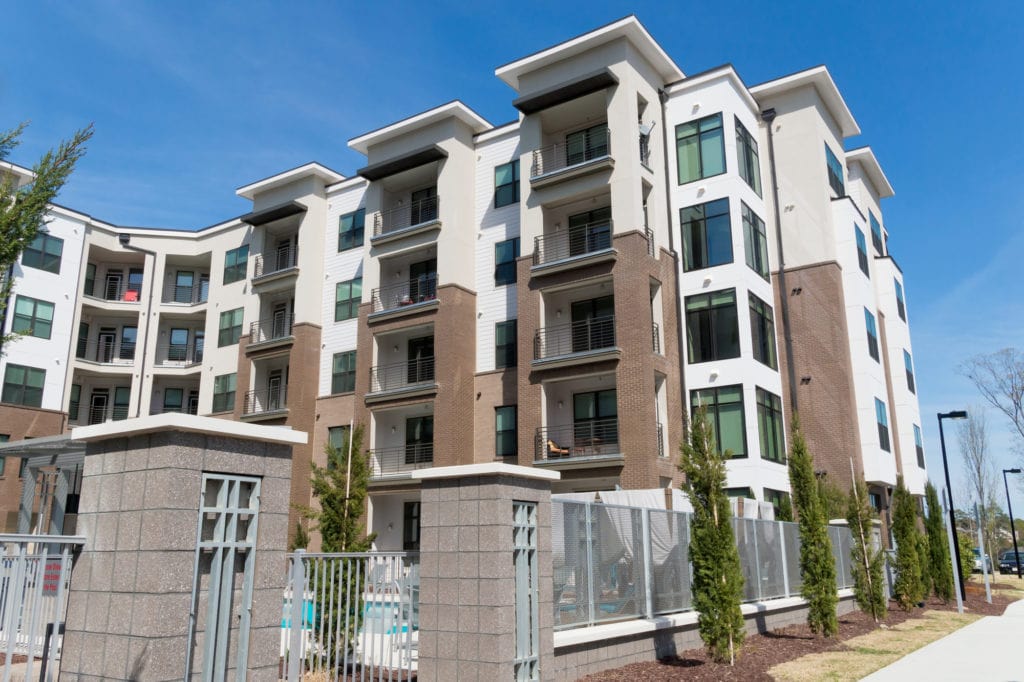If you want to learn how to buy an apartment building, apartment syndication is worth checking out. Apartment syndication passive investors pool their money to purchase apartment communities. These real estate assets generate revenue. The syndicator and investors each take their cut.
This complex investment strategy, however, has a high entry barrier. You’ll need years of real estate experience and a highly-skilled team. Dealing with other people’s money, after all, requires both experience and expertise.
If you have both and want to learn how to launch a business in apartment syndication, then stick around. We’re breaking down what you need to know about apartment syndication and how you could buy an apartment building with no money down from your pocket.
Let’s begin.
Apartment Syndication 101

Step 1: Build Your Real Estate Investing Experience
Apartment syndication, as we mentioned before, is not for real estate beginners. It is a long-term investment strategy with extensive upfront work.
As the apartment syndicator (also called the general partner), your responsibilities include:
- Consulting with real estate brokers to find profitable apartment buildings
- Working with team members to write and execute your business plan
- Using your network to find passive investors
- Work with attorneys to write up various legal documents during the syndication process
- Checking in with your property management company.
- Ensure the apartment building is well-maintained
If you don’t have experience with the above tasks, you’ll struggle with apartment syndication. Focus first on getting hands-on experience. Intern for a real estate firm. Work with professionals. Attend real estate seminars and join communities.
If you don’t have real estate experience, a business background will also work. Project management skills, especially, are excellent in real estate syndication. We still recommend that you hire a real estate advisor. Their insight will be helpful as you slowly build your own experience.
Even if you’re starting late as an investor, you can make fast progress, like Tom Burns, a surgeon who’s done really well with his real estate investments. Ryan and Tom shared some wine and talked investing.
Step 2: Set Your Apartment Syndication Goals
Since apartment syndication can be tricky, know your goals before diving in.
If you want to syndicate full-time, set a figure for how much you want to make. Reverse engineer that figure to understand how much you need to charge and how much work you'll need to put in.
For example, if you want to make $100,000 per year, how will that affect the acquisition fee that you charge? If you charge a 2% fee, you must syndicate at $5 million worth of apartment complexes. If you charge a 5% fee, then you must syndicate $2 million worth of assets. Of course, this does not include other fees that you may charge, but it offers a ballpark figure to hit.
We’ll be covering the various fees you can charge in a later section.

Step 3: Select a Target Market for Investing
In real estate, you’ve probably heard of the phrase, location, location, location. Your target market as an apartment syndicator will be the geographic location you’ll want to focus on.
When choosing a target market, you’ll want the area to be just the right size. Too large and there will be too many fluctuating variables — rent prices, school districts, crime rates. Too small and you’ll limit the opportunities available to you.
If you’re unsure of where to start, try evaluating the city you live in.
- Even if there are few leads, you’ll better understand the traits of a good target market. Another strategy is to use your online best friend: Google. Using specific keyword phrases like “top real estate markets in Nevada'' can offer a list of target markets you can scope out.
- Don’t feel, however, that you must limit your search to markets local to you. You can also search for markets outside your state.
- Find a list of at least five target markets that interest you.
- When evaluating the viability of a target market, you’ll want to put your analysis hat on. Some characteristics to examine include:
Population:
Has the population risen or decreased over the years? If it has decreased that suggests apartment vacancies and there might be some property assets you can syndicate. However, population declines could also indicate that the area is not a good area to live in, which may turn away tenants.
Increasing population, also, can be ideal. It shows that this area is desirable and if you secure an apartment complex, then tenants will occupy your apartment building.
Unemployment:
A community with high unemployment rates signals a bad market. You’ll want to search for target markets that are low or showing a downward trend. This shift indicates that businesses are improving and jobs are available.
Job Diversity:
While low unemployment is ideal, you’ll want to research job diversity within your target market. If one company employs too large a percentage of a population, then that area is at risk, should that company ever go belly-up.
Using these criteria, evaluate the viability of each target market on your list. You might learn that some markets show bad data, which you can eliminate from your list of markets to pursue.

Step 4: Build Your Real Estate Team
In apartment syndication, avoid doing everything yourself. This can waste valuable time and trigger unnecessary stress. Delegation is more efficient and can highlight each member’s strengths and background. The core members of your apartment syndication team will include:
- Yourself, as a general partner
- Your fellow general partners
- Limited partners
- Property management company
- Real estate broker
- Real estate attorney
Below is a summary of each professional’s role and expectations.
General Partners
The general partners are responsible for executing the syndication process from start to finish. You’ll be involved in overseeing the execution of your business plan. General partners are also referred to as sponsors or syndicators. In this article, you are a general partner.
As a general partner, you are responsible for:
- Selecting a target investment market
- Hiring your team members (fellow general partners, real estate property managers, attorneys)
- Sourcing capital from passive investors
- Managing the apartment syndication project from start to finish
General partners can be an individual or multiple individuals. With multiple general partners, the responsibilities are usually distributed by skills and background.
For example, one partner can oversee apartment operations. Another partner with a high net worth will sign their name on the loan. Another partner with an extensive network will find potential passive investors.
Limited Partners
The passive investors who pool their money to buy the apartment building are known as limited partners. The term “limited” comes from their liability being limited to their share of the ownership. The passive investor’s main responsibility, as you’ve probably guessed, is to fund all or a portion of the initial equity investment.
Although they are funding the purchase of the apartment building, they are not involved in the business plan’s execution. Except for tax management, the passive investor is completely passive.
Like general partners, limited partners can be an individual or multiple individuals. If there is only one limited partner, that individual will fund the entire equity investment. If there are multiple limited partners, each will contribute a portion of the equity investment. With apartment syndications, it’s more often the latter.

Property Management Company
As an apartment syndicator, you already have your plate full. You’re finding private investors, researching target markets, and closing property sales. If you try adding property management, something is bound to slip through the cracks. Even the most organized real estate professionals get overwhelmed. That’s where your property management company comes in.
They will save you time and stress by taking over the following responsibilities:
- Screen tenants
- Collect security deposits
- Set, collect, and adjust rent
- Initiate tenant evictions
- Handle leases
- Handle maintenance and repairs
- Oversee groundskeeping
- Stay up-to-date on landlord-tenant laws
If there are multiple general partners, one partner might want to take over the property management. This can be a viable decision, especially if that partner has previous experience. In most cases, though, the property management company is a third-party provider not listed as a general partner.
If you decide to go with a third-party, it will benefit you to use an experienced and competent company. Now, if you syndicate multiple properties within an area, you can use the same company to manage all of those properties. If you grow your real estate syndication into a large-scale real estate firm, you can even hire an in-house property management company.
Commercial Real Estate Broker
Your commercial real estate broker will focus on scoping out the available deals within a target market. When they find a deal that may catch your eye, they’ll create a marketing package and send it to you for consideration.
Having a quality real estate broker is key to your success. They will be your nose when sniffing out multifamily apartment buildings for sale within your target market.
Real Estate and Securities Attorney
A trusted real estate attorney and securities attorney is invaluable. They explain and help you write the necessary legal documents. Your attorneys also ensure that your contracts outline each party's responsibilities and expectations.
In the apartment syndication process, here are some legal documents you’ll encounter:
Purchase Sale Agreement:
This contract involves the buyer and seller of the apartment community. The seller’s attorney will draft the contract and send it for your review. Review the language with your attorney before signing and returning it.
Operating Agreement:
One operating agreement is created among the general partners. It will outline each member’s responsibilities and their ownership percentage. As a general partner, carefully comb through the legal language. Understand everything before agreeing to anything.
A second operating agreement is created between the general partners and limited partners. This document outlines the limited partners’ ownership percentage for each real estate asset.
Private Placement Memorandum:
This document discloses the risks involved when entering this contract. You should work with your securities attorney to prepare this document. Sometimes, this document includes points in the operating agreement. For example, you might see the minimum investment amounts and payment terms.

Step 5: Find Qualified Real Estate Investors
When figuring out how to get a loan for an apartment building, you’ll need to seek accredited or sophisticated investors.
An accredited investor has an annual income of at least $200,000 for the last two years or holds a net worth exceeding $1 million. A sophisticated investor, in contrast, does not meet these capital requirements. Their qualifications rely on their knowledge and experience. If they have a background in financing and business with investing experience, then they are qualified to invest with you.
If an investor does not meet either of these standards, they cannot source your capital requirements.
Finding qualified investors, however, is often easier than convincing them to invest in you. The secret to inspiring them to work with you is to earn their trust. Do this by building your experience, highlighting your expertise, and expanding your network.
Passive investors, naturally, want to work with people who have a track record of success within the real estate industry. Apartment syndication will be difficult for beginners to break into. It requires extensive knowledge of real estate, property management, and communication.
Effective marketing, also, is key to gaining a passive investor’s trust. Creating an online presence and establishing yourself as an expert on real estate (more on that later) will boost your credibility. It isn’t enough to just be skilled. You need to be skilled at what you do and skilled at marketing.
Building connections will have a significant impact on how many passive investors you can secure. Carefully organize all of your contacts. You’ll never know when that person you met at your child’s PTA fundraiser has a friend who’s seeking to invest. Passive investors are more welcoming when you share a contact. Getting that mutual contact to vouch for you can quickly establish your credibility.

Step 6: Choose Your Investment Strategy
In apartment syndication, how you write your business plan depends on the type of property you purchase. Different strategies will apply to different markets. Make sure that you have a clear plan when recruiting passive investors.
Here are two common strategies in apartment syndication:
Use What’s Already Working
As the name suggests, this strategy is to buy an apartment community that is already faring well. The occupancy level is usually high. The property should be well-maintained. Also, the unit fixtures and appliances are up-to-date. If you add even more value, like installing a fitness center, you can possibly increase the rent or use it as another marketing point.
You’re stepping into a system that’s already profitable and then taking over the cash flow.
Passive investors tend to favor this apartment syndication strategy. The risk tends to be less because the property is already profitable. But some strategies need more work than this one. Take the next strategy, for example.
The Property Flip
This follows the same strategy as house flipping: buy, fix it up, and then flip it for a profit.
Run-down apartments with declining occupancy rates are favorable. The strategy here is straightforward. You’ll buy the complex, fix it up, and then sell it for a profit.
When fixing up the community, aesthetic fixes make a huge difference. Splash on some new paint. Bring in your landscaping team. Update your branding. A combination of these and more can boost your asset's value.
After you increase tenant occupancy and stabilize it, you can then sell it for a massive profit.
The "Use What's Already Working" focuses more on monthly cash flow. This strategy, though, relies on the lump-sum sale after flipping the property.

Step 7: Find and Make an Offer on Apartment Deals
If you've reached this point, you've accomplished quite a lot:
- Created your team
- Selected a target market
- Recruited passive investors
- Decided on a syndication strategy
Keep in mind that these steps can take several weeks to months depending on how aggressive you are.
Creating the right team and writing your business plan are steps that you do not want to rush. These factors will determine the number and quality of your passive investors. Also, it will prepare you for success in executing your business plan.
Finally, it's time to find an actual apartment community to syndicate.
This is where having a real estate broker is helpful. A talented real estate broker will sniff out profitable opportunities for you.
If you find an apartment community that resonates with you, submit your letter of intent. This document acts as a formal submission of your intent to buy the property. If accepted, you will get in touch with the apartment owner. Arrange a time and place to sign the purchase-and-sale agreement. Upon signing, the property is under contract to purchase.
If you've purchased a home, you’re likely familiar with due diligence. In apartment syndication, you usually have up to 60 days to do this.
Here are some things you should check off your list:
- General home inspection
- Lead-based paint inspection
- Title history search
- Environmental assessment
If you find anything amiss, such as serious structural issues, you can withdraw from the contract.
Step 8: Meet With Your Passive Investors
You’ve taken care of the legwork of finding the apartment community. Before you can buy the property, you'll need approval from your limited partners.
Before scheduling a meeting with the partners, compile and organize your research. It should list the asset highlights, including property value and cash flow. Also, have your attorneys prepare the necessary legal documents. This includes the operating agreement, subscription agreement, and private placement memorandum.
Be sure to answer any questions your partners have. If all goes well, it's time to sign the legal documents. After obtaining their signatures, you can close the sale on the apartment community.
Step 9: Execute Your Business Plan
The limited partners funded the purchase and you’ve closed the sale. This concludes their role. It’s your responsibility, now, to execute what was outlined in your business plan.
For example, if you plan to improve the saleability of your apartment building before flipping it, now is the time to lay the groundwork. You can hire local contractors to get the necessary work completed.
Also, you will work with your property management company. Get them set up to oversee the day-to-day operations of the apartment building. Not having to deal directly with your apartment tenants will free up your time and resources for other projects.

Step 10: Sell The Property
Even if you’re not looking to flip the apartment complex within a short time frame, many syndications have an exit strategy. Some will hold the property for several years before selling it. Others may sell it after a few years. It depends on what was outlined in your business plan, contracts, and market conditions.
Similar to the property purchase, the general partners will manage the sales process. Again, the limited partners will not be involved in these steps. After the sale, the limited partners’ remaining equity is repaid. Also, any additional profits will be distributed among the limited and general partners. The percentage distribution will depend on what all parties agreed in the contract.
Making Money as a General Partner
There are a couple of ways that general partners make money. Many of them are through one-time fees and ongoing fees. Here is a breakdown of each:
Acquisition Fee
The acquisition fee is a one-time fee paid to the general partner at the closing of the apartment building. This fee is often likened to a consulting fee. The general partner is paid for executing the legwork of finding the apartment building, inspecting it, and then closing the sale.
The acquisition fee can range between 1% and 5% of the purchase price. Depending on the property price, this acquisition fee can be significant. For example, 5% of a $1 million property is $50,000. If you close three properties at that price within the same year, you’ve netted $150,000 from your acquisition fee alone.
Asset Management Fee
Unlike the one-time acquisition fee, the asset management fee is an ongoing fee. It is paid to the general partners for overseeing the partnership and asset. Remember: the limited partners do not execute the business plan. It is the general partner’s responsibility. This fee can be charged to ensure that the asset is maintained and performing as expected.
That means, however, that the general partners cannot sit and relax after the apartment building is secured and there is cash flow. The general partner must still check in with their property manager. Even if property management is outsourced, the general partner must confirm the asset is maintained. Also, it’s recommended to update the limited partners on how their asset is performing.
There are typically two ways to pay out the asset management fee.
The first is a percentage of the revenue that the asset generates — the industry standard is 1% to 2%. The other structure is to charge per unit. For example, if you syndicate a 500-unit asset and charge an annual $100 per unit, then your asset management fee would be $50,000 per year.
However, it’s important to note that the asset management fee is paid after the preferred return. The preferred return is the amount paid to the limited partners. That means that if an asset doesn’t generate enough for preferred return, then the asset management fee isn’t paid out. This is to ensure that the passive investor is receiving some return on their investment. Also, this structure incentivizes the general partners to maximize the asset’s value.
You now might be wondering which fee is superior: percentage-based or per unit-based?
Each fee structure has its pros and cons. The first will scale depending on how much revenue the asset generates, which incentivizes you to market and improve the property. The second structure guarantees a predictable cash flow but is unaffected by how poor or well the property performs. The answer to this debate will depend on what you and your general partners are most comfortable with.

Profit Split
Your contract should cover how to distribute profits beyond the preferred return. How will you agree to split the profits? What will the general partners take home and what will the limited investors take home?
The amount will depend on the percentages outlined in the contract — often it will be a 70/30 distribution with limited partners receiving 70% of the remaining profit.
For example, if the preferred rate is 10% and cash flow generates 15%, 10% is paid out to the limited partners. The remaining 5% is split between the general partners and limited partners. Within that 5%, limited partners receive 70%. The general partners receive the remaining 30%.
Making Money as a Limited Partner
Since a partnership involves at least two people, it’s important to know about your partners. You should, especially, learn how it is that limited partners get paid. What’s in it for them?
The main payment method to a limited partner is through preferred returns. The preferred return specifies how much the limited partner is paid — usually 8% of their current capital account.
It’s important to note that payment to the limited partners is often before the general partners receive payment.
For example, let’s say that cash flow is 8% and the preferred amount is 8%. That means the limited partners take the full 8%.
If cash flow is only 5%, then the limited partners will still receive that 5%. The unpaid amount may or may not accrue. It’s important to outline this detail in your private placement memorandum.
If cash flow, instead, is 10%, then 8% is paid to the limited partners and the remaining 2% is split between the limited partners and general partners.
Apartment Syndication: Pros
If you’re wondering whether this is a worthwhile business venture for you, consider reviewing a pros and cons list of real estate syndication.
Here are some benefits of syndicating apartments:
Attractive to Passive Investors
Investors, or limited partners, generate ongoing passive income through preferred returns. Investors, however, are not involved in day-to-day operations. This type of investor relationship may make it easier to find investors to fund your syndication project.
Profit Splitting
Any profit generated beyond the preferred return is split among the limited and general partners. This incentivizes you to work harder. The more revenue your assets generate, then the more money you take home.
Make Money With Other People’s Money
As an apartment syndicator, you’re investing other people’s money. Even though you do not have liquid capital, you can still profit from this opportunity. Instead of capital, you’re offering your experience, expertise, and the actual execution of the business plan.
Apartment Syndication: Cons
Despite its attractive features, apartment syndication also has its disadvantages. Here are a few cons of real estate syndicating:
Lack of Control
In apartment syndication, your team members usually split the responsibilities. General partners will fulfill different tasks. Real estate agents will advise. Property managers will maintain the physical asset. Lawyers will draft and review contracts.
While you may perform your roles perfectly, other members may fall short. That’s why building an experienced and competent team is necessary for succeeding in apartment syndication.
High Entry Barriers
As we mentioned before, apartment syndication isn’t for the real estate beginner. To break into this field, you’ll need years of experience and strong connections. Without this, you’ll struggle with securing enough capital from passive investors. And without capital, you can’t purchase an apartment complex.
Intensive Management
Managing an apartment community can be more complex than managing a single-family unit. There's significantly more stress if you decide to manage the property and forego hiring a property management team. You will need to respond to repair orders, answer tenant inquiries, and ensure proper maintenance of property.
Common Apartment Syndication Mistakes
There are countless moving parts within apartment syndication. If you want to save time, energy, and headaches then be mindful about avoiding these mistakes:

Liability Issues
The law is an entire professional field that you have neither the time (or interest) to learn. That’s why it’s worth working with a security lawyer. Outsource this responsibility to a legal professional. Their legal expertise will navigate you through the apartment syndication process. Also, be sure to review all legal documents with them before signing and distributing them among your team.
Poor Marketing
Years of experience alone isn’t enough to achieve your goals, especially when it comes to apartment syndication. You will need to learn how to properly market yourself so that investors trust you with their money.
Market yourself as a real estate syndication expert by increasing your online presence. You can publish blog articles, post videos, or start a podcast talking about real estate syndication. Seeing your content pop up on Google search results and a large following will boost your credibility.
Poor Communication
Passive investors are more than sources of capital — they’re real people who chose to invest with you. After you purchase the apartment and revenue starts flowing in, don’t make the mistake of falling silent.
You receive an asset management fee and that includes communicating regularly with the limited partners. Your investors will appreciate progress reports on how their assets are performing.
Frequently Asked Questions:
How much money do you need to buy an apartment building?
There is no exact figure to list when it comes to answering how much it costs to buy an apartment building. The price will fluctuate wildly depending on a variety of factors:
- State and county
- Square footage
- Number of units
- Target residents (e.g. families, seniors)
For example, if you conduct a search for apartment complexes on LoopNet, it can cost between $1.2 million and $6 million in Washington. In California, you can find apartment communities that exceed $10 million. And some 4 unit apartment buildings for sale are less than $1 million in North Carolina.
These prices, however, do not factor in repairs and renovations you’ll want to do after purchasing the apartment building. If you’re planning to purchase an apartment community for a quick flip, there’s more number-crunching involved. Be sure to get an estimated value of the renovations and add it to the building’s purchase price.
Is owning apartments profitable?
Yes, buying and owning apartments via real estate syndication can be a profitable business venture. The amount of money that an apartment syndicator makes varies. It will depend on what fees you charge and how many properties you syndicate.

How do I buy my first apartment complex?
If you’re brand new to real estate, then you’ll want to gain a few years of experience before starting apartment syndication. Still, you might be wondering what steps to take to buy your first apartment complex — whether on your own, crowdfunded, or funded by private investors.
The process would largely follow many of the steps outlined earlier. You’ll want to work with a real estate broker to find apartments for sale within your target market. When you locate a property that interests you, you can submit an offer and letter of intent to purchase. You must still complete your due diligence. If everything clears, move forward with closing the sale.
Again, we recommend that you hire an attorney and property manager. Maintaining the properties and doing legal research is a poor use of your time. Outsource those responsibilities. It will save you time, headaches, and confusion.
Is investing in an apartment building a good investment?
If you’re wondering whether buying an apartment complex is a good investment, the short answer is yes. Recent residential trends show apartments increasing in popularity. That shows that purchasing apartment buildings is a good investment choice.
If you’re wondering why, it’s because homeownership is becoming increasingly expensive. With more Americans unable to afford a house, they turn to apartment renting. This has caused apartment occupancy to increase, along with rent rates.

Do apartments increase in value?
Like many homes, apartments can appreciate in value over time. Current trends also suggest that apartments will be a good long-term investment:
- Millennials are more likely to rent than buy a home due to housing prices
- Apartment complexes can transition into retirement communities for retiring baby boomers
If you have the experience and have been curious about syndicating, now is the time to start. Real estate trends are presenting a golden opportunity for you.
What is the average salary for an apartment property manager?
If you’re serious about apartment syndication, you’ll want to hire an apartment property manager. They will take over the day-to-day operations of maintaining the property. You might be wondering, then, how much an apartment property manager will cost. The average salary for an apartment property manager is $16.47 per hour or $34,256 annually. This figure will vary from state to state.
Apartment Syndication: The Bottom Line
If you’ve made it to the end of this guide, you’ve learned how complex apartment syndication can be.
If you have the experience and drive, then apartment syndication can be a worthwhile investment. Depending on your efforts, it can supplement or replace your income. If you have a love for real estate, project management, and networking, then definitely give real estate syndicating a try.
If you’re an entrepreneur who’s ready to learn how to invest the profits from your business into real estate holdings, you don’t have to learn the hard way. You sure don’t have to do it alone. We recommend joining The One Percent community, where entrepreneurs create wealth and passive income. Check it out and join us.













